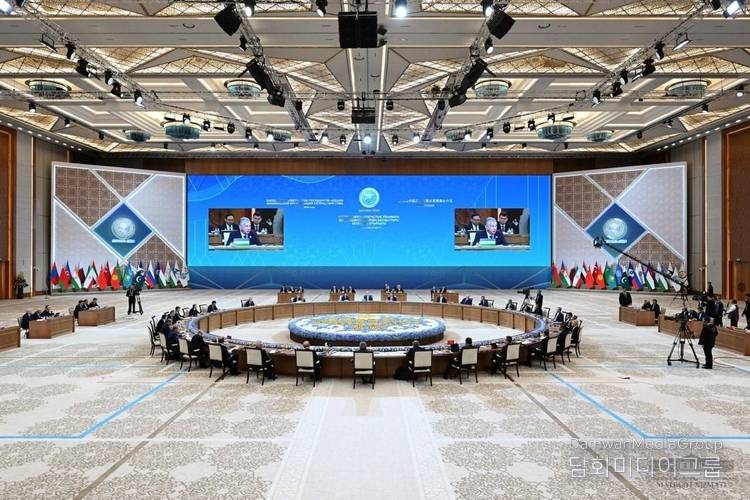The following article was contributed by Rakhmatulla I. Nurimbetov, PhD, researcher of the Tashkent State University of Oriental Studies to the Diplomacy Journal for publication through the Embassy of Uzbekistan in Seoul. –Ed.
On July 4, 2024, in Astana, in the capital of Kazakhstan, 24th Meeting of the Council of Heads of State of the Shanghai Cooperation Organization (SCO) took place, attended by more than dozen leaders of Eurasian countries and the heads of several international organizations, including the UN Secretary General Antonio Guterres.
One of its key results was the accession of Belarus as 10-th member of the SCO. The body, once founded in mid-1990-s as a “Shanghai Five” with goal to settle the border issues between China, Russia and three Central Asian countries – Kazakhstan, Kyrgyzstan and Tajikistan, in almost three decades became “Shanghai Ten”, expanding its geography further to the South Asia, Middle East and the Eastern Europe.
The SCO’s ongoing expansion has prompted broader discussions about the Organization’s growing role and responsibility in Eurasia, as it has brought together big players like China, Russia, and India, as well as influential states in their respective regions, such as Pakistan, Iran, Uzbekistan and Kazakhstan, which claim to be the so-called “middle powers”.
For the SCO itself, enlargement creates not only new opportunities for the growth, but also some challenges. Indeed, due to the enlargement it effectively transformed from a regional structure whose tasks were limited mainly to maintaining security and regional cooperation in Central Asia in early 2000-s into a Eurasian organization with a broad agenda. The increase in the number of SCO participants changes its agenda and very essence, as they represent different regions, with different development models and cultural peculiarities. Some of these states stand for different strategies on key regional and global policy issues, such as reforming global governance, international institutions including the UN, climate change, energy transition, etc.
First of all, it concerns India, which tries to keep some distance from the SCO. Thus, last year, during its Chairmanship in the Organization, India at the last moment decided to hold the New Delhi summit online. This year, Prime Minister Modi did not attend the Astana summit, sending Foreign Minister Mr. Jaishankar. A number of observers assessed this as a decline in India’s interest in the SCO against the backdrop of the intensifying geopolitical struggle of the West with China and Russia. Apparently, India does not want to strongly associate itself with the Organization, which is viewed in the West as an anti-Western bloc.
India’s positioning, if it further would to seek balance between West and the SCO, may complicate the process of developing consolidated approaches within the Organization to key issues on the global agenda. In absence of this, it will be difficult for the SCO to play its role as one of potential backbones of new world order on behalf of Eurasia, as some members of the institution, in particular Russia and China, would like to see.
Another challenge that the SCO would likely to face at least over the medium term is reform agenda. Expansion and changing geopolitical dynamics cause the modernization and improvement of the institutions and legal framework of the Organization, which were formed at the very beginning of the twentieth century. The world has changed a lot since then, and so has the balance in Eurasia and within the SCO itself.
In the past, it was easier for the Organization to reach compromises on its priorities, as the SCO structure was rather primitive: China, Russia and four Central Asian countries. Today, it is difficult to talk about an unambiguous structure of the Organization, whose members are simultaneously India, which claims to be the leader of the Global South, its traditional rival in the region – Pakistan, Iran, and Belarus, which should adapt to the new cooperation platform with diverse members.
The SCO reform process was launched at the Samarkand Summit on September 16, 2022, which was held under the chairmanship of the Republic of Uzbekistan. This Central Asian country, thanks to which the integration processes in region have gained new dynamics in recent years, is also pursuing a proactive course with regard to the SCO. In particular, speaking at the Astana summit, President of Uzbekistan H.E. Shavkat Mirziyoyev, once again emphasized the need to “reset” the SCO agenda, particularly to boost economic cooperation among member states and reform process. The Uzbek leader stranded firmly for keeping the SCO’s openness and non-bloc status, too.
In fact, according to the media, the draft reform document of the SCO was presented to the leaders in the Astana summit. So, in near future some initial institutional changes should be occurred. It would be timely step in the right direction.
It is very important that Central Asian countries, despite shifting geographical focus of the SCO, in result of its transformation, actively support expansion and reforming of the Organization. In an enlarged SCO, they see new prospects for economic cooperation and strengthening interconnectivity in Eurasia. This is quite understandable. With the revival of the Silk Road under new geopolitical and geo-economic circumstances, Central Asia can once again regain its role as one of the key transports and transit hubs of the continent. The SCO could be an important cooperation platform to implement these strategies. In this regard the states of the region are interested in the stabilizing role of the Organization, both in Central Asia itself and in neighboring regions.
Of course, further expansion of the SCO could somehow complicate the internal relationship, as well decision-making process. Nevertheless, the SCO will by no means lose its role as an important platform for promoting Eurasian multilateralism, which is sadly lacking in today’s turbulent world.
